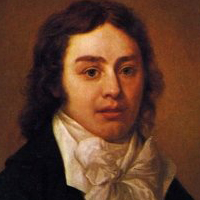Frost at Midnight by Samuel Taylor Coleridge: Summary
Frost at Midnight was written by Coleridge to celebrate the birth of his son, Hartley, at Stowey in 1798, and it was first published with Fears in Solitude and France: an Ode. The poem is written in a contemplative mood. The atmosphere, as described in the poem, is perfectly peaceful and calm and there is nothing to disturb it. This quietness of the night is maintained throughout the poem, and the poet's thoughts are also mild and gentle in a similar manner.

S. T. Coleridge (1772-1834)
No violence of thought occurs to disturb the harmony of his mind. The poem has also a peculiar autobiographical interest. The poet's thoughts wander back to his own past when he was a student at Christ's Hospital and fondly believed in certain popular superstitions. Not only does the poet think about his past life, he also looks forward and tries to guess the future of his son, Hartley, who, as he hopes, would pass his life in the constant company of nature and would lead a peaceful and happy life. His son would learn from nature the eternal values of life.
The frost, in the beginning of the poem, is secretly performing its work without being helped by the wind. All the inhabitants of the cottage are sleeping and the poet is left all alone in that loneliness which is favorable to philosophical thinking. The poet is all alone, except that his child is sleeping peacefully in the cradle by his side. Sea, hill, wood, the populous village are all silent as dreams. The thin blue flame of fire, lying low, is absolutely motionless. The only thing that has any movement is that film, which is fluttering on the grate. There is a sense of sympathy between the poet and this film because both are awake and active. The idle spirit of the poet interprets the irregular movements of the film according to his own moods and whims.
The poet's thoughts are now taken back to his past when he was a student at his school (Christ's Hospital), and used to believe that the fluttering film was a prophetic symbol and foretold the arrival of some relative or friend. Whenever he saw the fluttering film, there he became excited and hopeful and dreamt of his sweet birth-place, and the old church-tower whose bells rang from morning to evening all the hot Fair-day. The sound of the church bells appeared to him to be a prophecy of future events. He gazed in this manner at the film and thought of his home, which made him fall asleep after some time. But even in his sleep, he dreamt of the same soothing things. The same ideas continued coming in his mind the next morning also. But he was afraid of his strict teacher and therefore, though he looked at his book, his mind was wandering here and there. If the door of the room was half opened by somebody, he hastily looked in that direction. His heart leaped up with joy because he expected to see the face of some visitor-either a townsman, or his beloved sister or some play mate of his boyish days.
Addressing his baby who is sleeping in the cradle by his side, he says that his (i. e. the child's) gentle breathings in this calm and quiet atmosphere fill up the gaps of his mind when he transfers his thinking from one idea to the other. It thrills the poet's heart to think that his child will be brought up and educated in a different atmosphere than his own. The poet himself was brought up in the city of London (i. e. away from nature) where he was confined all the time in dim cloisters and could not see any beautiful sights of nature except the sky and the stars. But his son will be brought up in natural surroundings. He will wander here and there like wind by lakes and sandy shores, beneath the rocks of ancient mountains, and beneath the clouds. In this way his baby shall see the beautiful shapes and hear the lovely sounds of Nature through which God teaches humanity. His presence in all the objects of Nature and the presence of all the objects in Him. Nature is the great universal Teacher who will mold the spirit of his son.
By living in constant company of Nature his son will learn to love all seasons. He will love the summer season when the earth IS covered all around with greenness. He will also love the winter season when the redbreast sits and sings between the tufts of snow on the leafless branches of an apple tree covered all over with moss. He will also love the rainy season when the raindrops fall from the caves and their sound is heard only when the storm stops for short intervals and silence prevails. Or if the frost starts forming itself unseen, he will also love the icicles (when water-drops are frozen due to coldness) silently shining in the light of the quiet moon.
Cite this Page!
Shrestha, Roma. "Frost at Midnight by Samuel Taylor Coleridge: Summary." BachelorandMaster, 2 Nov. 2017, bachelorandmaster.com/britishandamericanpoetry/frost-at-midnight-summary.html.
Related Topics
Kubla Khan: Summary and Analysis
The Rime of the Ancient Mariner: Summary & Analysis
Christabel: Summary and Analysis
Biography of Samuel Taylor Coleridge
 |
bachelorandmaster.com |